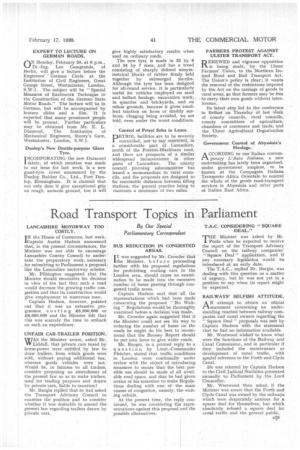Road Transport Topics in Parliament
Page 35

If you've noticed an error in this article please click here to report it so we can fix it.
LANCASHIRE MOTORWAY TOO COSTLY.
I N the House of Commons, last week, Captain Austin Hudson announced that, in the present Circumstances, the Minister was not able to encourage Lancashire County Council to undertake the preparatory work, necessary for submitting to Parliament a proposal like the Lancashire motorway scheme.
Mr. Pilkington suggested that the Minister should reconsider his decision in view of the fact that such a road would decrease the growing traffic congestion and that its construction would give employment to numerous men.
Captain Hudson, however, pointed out that it was an extensive programme. costing £5,000,000 or £6,000,000 and the Minister felt that this was scarcely the time to embark on such an expenditure.
UNFAIR CAR-TRAILER POSITION. 'WAS the Minister aware, asked Mr. W Liddall, that private cars taxed by horse-power were entitled by law to draw trailers, from which goods were sold, without • paying additional tax, whereas goods vehicles were not. Would he, in fairness to all traders, consider proposing an amendment of the present law so as to make trailers, used for trading purposes and drawn by private cars, liable to taxation?
Mr. Burgin replied that he had asked the Transport Advisory Council to examine the position and to consider whether it was desirable to amend the present law regarding trailers drawn by private cars, BUS REDUCTION IN CONGESTED AREAS.
iT was suggested. by Mr. Crowder that the .Minister, bef ore proceeding farther with his proposed regulations for prohibiting waiting cars in the London area, should cause an examination to be made into the excessive number of buses • passing through congested traffic areas. • Captain Hudson said that all the representations which had been made concerning the proposed "No Waiting " Regulations would be thoroughly examined before .a decision was made,
Mr. Crowder again suggested that if the Minister could not see his way to reducing the number of buses on the roads he might do his best to recommend that the Bressey Report should be put into force to give wider roads.
Mr. Burgin, in a printed reply to a question by Lieut.-Commander Fletcher, stated that traffic conditions in London were continually under review with the object of introducing measures to secure that the best possible use should be made of all available road space, and that he had given notice of his intention to make Regulations dealing with one of the main causes of congestion, namely, the waiting vehicle.
At the present time, the reply continned, he was considering the representations against this proposal and the possible alternatives. T .A.C. CONSIDERING "SQUARE DEAL."
THE Minister was asked by Mr. Poole when be expected to receive the report of the Transport Advisory Council on the railway companies'
Square Deal" application, and if any necessary legislation would be introduced at an early date.
The T.A.C., replied Mr. Burgin, was dealing with this question as a matter of urgency, but he was not yet in a position to say when its report might be expected.
RAILWAYS' SELFISH ATTITUDE.
AN attempt to obtain an official statement concerning an understanding reached between railway companies and canal owners regarding the " Square Deal" proposals was met by Captain Hudson with the statement that he had no information available.
Mr. Westwood wished to know what were the functions of the Railway and Canal Commission, and in particular if they included the maintenance or development of canal traffic, with special reference to the Forth and Clyde Canal.
He was referred by Captain Hudson to the Civil Judicial Statistics presented annually to Parliament by the Lord Chancellor.
Mr. Westwood then asked, if the Minister was aware that the Forth and Clyde Canal was owned by the railways which were desperately anxious for a square deal for themselves, but which absolutely refused a square deal for canal traffic and the general public.




















































































